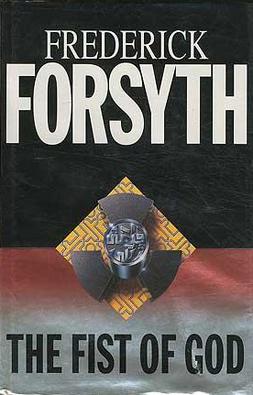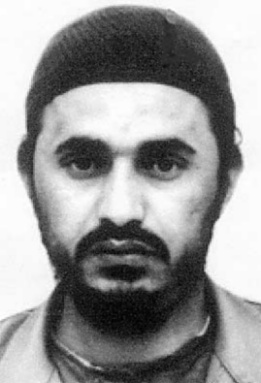Sources
| | This article about a fictional character from a novel is a stub. You can help Wikipedia by expanding it. See guidelines for writing about novels. Further suggestions might be found on the article's talk page. |
Mike Martin is the protagonist in two novels, The Fist of God (1994) and The Afghan (2006) by Frederick Forsyth.
Martin is an Englishman who looks remarkably Arab because his maternal grandmother (mentioned in the novel as "Indira Bohse" - likely to be Indira Bose) was Bengali.
His father (Nigel Martin) was an accountant in an unnamed English Oil Company and his mother (half-Indian Susan Granger) was an air-stewardess with BOAC. His father was posted in the Middle East and so he (and his brother) grew up in Baghdad, becoming fluent in Arabic and English. After moving to England during a time of great political uncertainty in Iraq, he joined the Paras at the age of 19, and soon became an officer. Later, he was accepted into the Special Air Service.
In his late 30s, he was employed by the Secret Intelligence Service during Operation Desert Shield to lead the Kuwaiti resistance disguised as a Bedouin. Shortly after he was sent to run the agent "Jericho", along with the CIA, in Baghdad. Upon learning of the location of the Fist of God, he leads the SAS patrol that paints it for an airstrike.
He retired from the army after 25 years of service. However, he was called by Secret Intelligence Service and Central Intelligence to infiltrate the Al-Qaeda using his knowledge from the 1980s Mujahideen resistance-assistance to his advantage.
After several months successfully undercover inside Al-Qaeda, he sacrificed his life in order to stop an attack against the ocean liner Queen Mary 2, where the G8 summit was being held.

Ahmad Shah Massoud was an Afghan politician and military commander. He was a powerful guerrilla commander during the resistance against the Soviet occupation between 1979 and 1989. In the 1990s, he led the government's military wing against rival militias; after the Taliban takeover, he was the leading opposition commander against their regime until his assassination in 2001.

Osama bin Laden was a Saudi-born Islamic dissident and militant leader who was the founder and first general emir of al-Qaeda from 1988 until his death in 2011. Ideologically a pan-Islamist, his group is designated as a terrorist group by the United Nations Security Council, the North Atlantic Treaty Organization (NATO), the European Union, and various other countries.

The Special Activities Center (SAC) is a division of the United States Central Intelligence Agency responsible for covert and paramilitary operations. The unit was named Special Activities Division (SAD) prior to 2015. Within SAC there are two separate groups: SAC/SOG for tactical paramilitary operations and SAC/PAG for covert political action.

Jama'at al-Tawhid wal-Jihad, abbreviated as JTJ or Jama'at, was an Islamic extremist Salafi jihadist terrorist group. It was founded in Jordan in 1999, and was led by Jordanian national Abu Musab al-Zarqawi for the entirety of its existence. During the Iraqi insurgency (2003–11), the group became a decentralized network with foreign fighters with a considerable Iraqi membership.

Abdullah Yusuf Azzam was a Palestinian Islamic scholar and jihadist. Belonging to the Salafi movement, during the Soviet–Afghan War of the 1980s, he advocated defensive jihad by Muslims worldwide to help the Afghan mujahideen fight against the Soviet forces and Afghan Government forces in the Democratic Republic of Afghanistan.

The Iraqi National Intelligence Service (INIS) is an intelligence agency of the Iraqi government that was created in April 2004 on the transitional authority of the Coalition Provisional Authority, following the American invasion of Iraq a year prior.

The Fist of God is a 1994 suspense novel by British writer Frederick Forsyth, with a fictitious retelling of the Iraqi Project Babylon and the resulting "supergun".
The Saddam–al-Qaeda conspiracy theory was based on false claims made by the United States government, alleging that a highly secretive relationship existed between Iraqi president Saddam Hussein and the Sunni pan-Islamist militant organization al-Qaeda between 1992 and 2003. The George W. Bush administration promoted it as a main rationale for invading Iraq in 2003.

The Inter-Services Intelligence is the largest and best-known component of the Pakistani intelligence community. It is responsible for gathering, processing, and analyzing any information from around the world that is deemed relevant to Pakistan's national security. The ISI reports to its director-general and is primarily focused on providing intelligence to the Pakistani government.
This article is a chronological listing of allegations of meetings between members of al-Qaeda and members of Saddam Hussein's government, as well as other information relevant to conspiracy theories involving Saddam Hussein and al-Qaeda.

The Afghan is a 2006 thriller novel by British writer Frederick Forsyth.

The Battle of Tora Bora was a military engagement that took place in the cave complex of Tora Bora, eastern Afghanistan, from November 30 – December 17, 2001, during the final stages of the United States invasion of Afghanistan. It was launched by the United States and its allies with the objective to capture or kill Osama bin Laden, the founder and leader of the militant organization al-Qaeda. Al-Qaeda and bin Laden were suspected of being responsible for the September 11 attacks three months prior. Tora Bora is located in the Spīn Ghar mountain range near the Khyber Pass. The U.S. stated that al-Qaeda had its headquarters there and that it was bin Laden's location at the time.

Abu Musab al-Zarqawi, born Ahmad Fadeel al-Nazal al-Khalayleh, was a Jordanian jihadist who ran a terrorist training camp in Afghanistan. He became known after going to Iraq and being responsible for a series of bombings, beheadings, and attacks during the Iraq War, reportedly "turning an insurgency against US troops" in Iraq "into a Shia–Sunni civil war". He was sometimes known by his supporters as the "Sheikh of the slaughterers".

Operation Cyclone was the code name for the United States Central Intelligence Agency (CIA) program to arm and finance the Afghan mujahideen in Afghanistan from 1979 to 1992, prior to and during the military intervention by the USSR in support of the Democratic Republic of Afghanistan. The mujahideen were also supported by Britain's MI6, who conducted their own separate covert actions. The program leaned heavily towards supporting militant Islamic groups, including groups with jihadist ties, that were favored by the regime of Muhammad Zia-ul-Haq in neighboring Pakistan, rather than other, less ideological Afghan resistance groups that had also been fighting the Soviet-oriented Democratic Republic of Afghanistan administration since before the Soviet intervention.
The following is a list of attacks which have been carried out by Al-Qaeda.

Hamza bin Osama bin Mohammed bin Awad bin Laden, better known as Hamza bin Laden, was a Saudi Arabian-born member of Al-Qaeda. He was a son of Al-Qaeda leader Osama bin Laden, and, following his father's death in 2011 and the attacks on the World Trade Center in New York City, he was described as an emerging leader of the Al-Qaeda organization.

Joint Special Operations Command Task Force in the Iraq War was a joint American and British special operations unit, of which little is publicly known. It is described as a "hunter-killer team" with its core made up of the United States Army's 1st Special Forces Operational Detachment-Delta and the 75th Ranger Regiment, as well as the United States Naval Special Warfare Development Group and members of the United States Air Force's 24th Special Tactics Squadron, all under Joint Special Operations Command (JSOC) and elements from the United Kingdom Special Forces, including the Special Air Service, Special Boat Service (SBS), Special Reconnaissance Regiment (SRR), 18 (UKSF) Signal Regiment and the Special Forces Support Group (SFSG). The unit was reported to be responsible for the cross border raid into Syria from Iraq in October 2008 that resulted in eight deaths including Abu Ghadiya, along with several US operations in the Horn of Africa targeting al-Qaeda.

Kabul, capital of Afghanistan, fell in November 2001 to the Northern Alliance forces during the War in Afghanistan. Northern Alliance forces began their attack on the city on 13 November and made swift progress against Taliban and Al-Qaeda forces that were heavily weakened by American and British air strikes. The advance moved ahead of plans, and the next day the Northern Alliance forces entered Kabul and met no resistance inside the city. Taliban forces retreated to Kandahar in the south.
The Camp Chapman attack was a suicide attack by Humam Khalil Abu-Mulal al-Balawi against the Central Intelligence Agency facility inside Forward Operating Base Chapman on December 30, 2009. One of the main tasks of the CIA personnel stationed at the base was to provide intelligence supporting drone attacks in Pakistan. Seven American CIA officers and contractors, an officer of Jordan's intelligence service, and an Afghan working for the CIA were killed when al-Balawi detonated a bomb sewn into a vest he was wearing. Six other American CIA officers were wounded. The bombing was the most lethal attack against the CIA in more than 25 years.